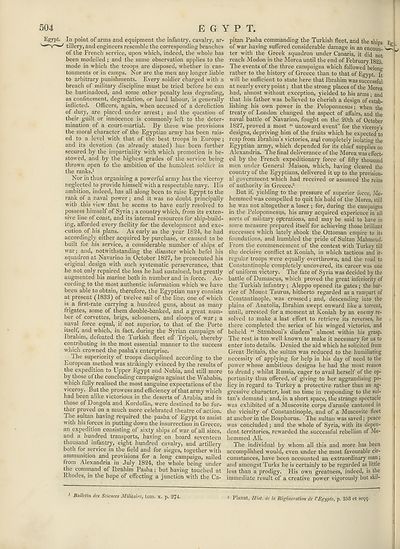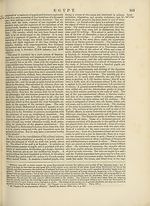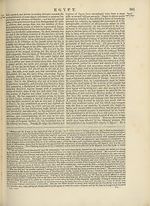Encyclopaedia Britannica > Volume 8, DIA-England
(514) Page 504
Download files
Complete book:
Individual page:
Thumbnail gallery: Grid view | List view

504
Egypt.
EGYPT.
In point of arms and equipment the infantry, cavalry, ar-
/ tillery, and engineers resemble the corresponding branches
of the French service, upon which, indeed, the whole has
been modelled ; and the same observation applies to the
mode in which the troops are disposed, whether in can¬
tonments or in camps. Nor are the men any longer liable
to arbitrary punishments. Every soldier charged with a
breach of military discipline must be tried before he can
be bastinadoed, and some other penalty less degrading,
as confinement, degradation, or hard labour, is generally
inflicted. Officers, again, when accused of a dereliction
of duty, are placed under arrest; and the question of
their guilt or innocence is commonly left to the deter¬
mination of a court-martial. By these wise provisions
the moral character of the Egyptian army has been rais¬
ed to a level with that of the best troops in Europe ;
and its devotion (as already stated) has been further
secured by the impartiality with which promotion is be¬
stowed, and by the highest grades of the service being
thrown open to the ambition of the humblest soldier in
the ranks.1
Nor in thus organizing a powerful army has the viceroy
neglected to provide himself with a respectable navy. His
ambition, indeed, has all along been to raise Egypt to the
rank ot a naval power; and it was no doubt principally
with this view that he seems to have early resolved to
possess himself of Syria ; a country which, from its exten¬
sive line of coast, and its internal resources for ship-build¬
ing, afforded every facility for the development and exe¬
cution of his plans. As early as the year 1824., he had
accordingly either acquired by purchase, or caused to be
built for his service, a considerable number of ships of
war; and, notwithstanding the disaster which befel his
squadron at Navarino in October 1827, he prosecuted his
original design with such systematic perseverance, that
he not only repaired the loss he had sustained, but greatly
augmented his marine both in number and in force. Ac¬
cording to the most authentic information which we have
been able to obtain, therefore, the Egyptian navy consists
at present (1833) of twelve sail of the line, one of which
is a first-rate carrying a hundred guns, about as many
trigates, some of them double-banked, and a great num¬
ber of corvettes, brigs, schooners, and sloops of war; a
naval force equal, if not superior, to that of the Porte
itself, and which, in fact, during the Syrian campaign of
Ibrahim, defeated the Turkish fleet off Tripoli, thereby
contributing in the most essential manner to the success
which crowned the pasha’s enterprise.
The superiority of troops disciplined according to the
European method was strikingly evinced by the results of
the expedition to Upper Egypt and Nubia, and still more
by those of the concluding campaigns against the Wahabis,
which fully realised the most sanguine expectations of the
viceroy. But the prowess and efficiency of that army which
had been alike victorious in the deserts of Arabia, and in
those of Dongola and Kordofan, were destined to be fur¬
ther proved on a much more celebrated theatre of action.
The sultan having required the pasha of Egypt to assist
with his forces in putting down the insurrection in Greece,
an expedition consisting of sixty ships of war of all sizes,
and a hundred transports, having on board seventeen
thousand infantry, eight hundred cavalry, and artillery
both for service in the field and for sieges, together with
ammunition and provisions for a long campaign, sailed
from Alexandria in July 1824, the whole being under
the command of Ibrahim Pasha; but having touched at
Rhodes, in the hope of effecting a junction with the Ca-
pitan Pasha commanding the Turkish fleet, and the ships
of war having suffered considerable damage in an encoun¬
ter with the Greek squadron under Canaris, it did not
reach Modon in the Morea until the end of February 1825.
The events of the three campaigns which followed belong
rather to the history of Greece than to that of Egypt, ft
will be sufficient to state here that Ibrahim was successful
at nearly every point; that the strong places of the Morea
had, almost without exception, yielded to his arms; and
that his father was believed to cherish a design of estab¬
lishing his own power in the Peloponnesus; when the
treaty of London changed the aspect of affairs, and the
naval battle of Navarino, fought on the 20th of October
1827, proved a most “ untoward event” for the viceroy’s
designs, depriving him of the fruits which he expected to
reap from Ibrahim’s victories, aud completely isolating the
Egyptian army, which depended for its chief supplies on
Alexandria. The final deliverance of the Morea was effect¬
ed by the French expeditionary force of fifty thousand
men under General Maison, which, having cleared the
country of the Egyptians, delivered it up to the provision¬
al government which had received or assumed the reins
of authority in Greece.2
But if, yielding to the pressure of superior force, Me-
hemmed was compelled to quit his hold of the Morea, still
he was not altogether a loser ; for, during the campaigns
in the Peloponnesps, his army acquired experience in all
sorts of military operations, and may be said to have in
some measure prepared itself for achieving those brilliant
successes which lately shook the Ottoman empire to its
foundations, and humbled the pride of Sultan Mahmoud.
From the commencement of the contest with Turkey till
the decisive conflict at Koniah, in which tacticos and ir¬
regular troops were equally overthrown, and the road to
Constantinople completely uncovered, its career was one
of uniform victory. The fate of Syria was decided by the
battle of Damascus, which proved the great inferiority of
the Turkish infantry ; Aleppo opened its gates; the bar¬
rier of Mount Taurus, hitherto regarded as a rampart of
Constantinople, was crossed; and, descending into the
plains of Anatolia, Ibrahim swept onward like a torrent,
until, arrested for a moment at Koniah by an enemy re¬
solved to make a last effort to retrieve its reverses, he
there completed the series of his winged victories, and
beheld “ Stamboul’s diadem” almost within his grasp.
The rest is too well known to make it necessary for us to
enter into details. Denied the aid which he solicited from
Great Britain, the sultan was reduced to the humiliating
necessity of applying for help in his day of need to the
power whose ambitious designs he had the most reason
to dread ; whilst Russia, eager to avail herself of the op¬
portunity thus offered, of giving to her aggrandising po¬
licy in regard to Turkey a protective rather than an ag¬
gressive character, lost no time in responding to the sul¬
tan’s demand ; and, in a short space, the strange spectacle
was exhibited of a Muscovite corps d’armee cantoned in
the vicinity of Constantinople, and of a Muscovite fleet
at anchor in the Bosphorus. The sultan was saved; peace
was concluded; and the whole of Syria, with its depen¬
dent territories, rewarded the successful rebellion of Me-
hemmed AH.
The individual by whom all this and more has been
accomplished would, even under the most favourable cir¬
cumstances, have been accounted an extraordinary man;
and amongst Turks he is certainly to be regarded as little
less than a prodigy. His own greatness, indeed, is the
immediate result of a creative power vigorously but skil-
5
1 Bulletin dcs Sciences Militaire, tom. x. p. 274.
2 Planat, Hist, de la Regeneration de I'Egypte, p. 258 et seqq.
Egypt.
EGYPT.
In point of arms and equipment the infantry, cavalry, ar-
/ tillery, and engineers resemble the corresponding branches
of the French service, upon which, indeed, the whole has
been modelled ; and the same observation applies to the
mode in which the troops are disposed, whether in can¬
tonments or in camps. Nor are the men any longer liable
to arbitrary punishments. Every soldier charged with a
breach of military discipline must be tried before he can
be bastinadoed, and some other penalty less degrading,
as confinement, degradation, or hard labour, is generally
inflicted. Officers, again, when accused of a dereliction
of duty, are placed under arrest; and the question of
their guilt or innocence is commonly left to the deter¬
mination of a court-martial. By these wise provisions
the moral character of the Egyptian army has been rais¬
ed to a level with that of the best troops in Europe ;
and its devotion (as already stated) has been further
secured by the impartiality with which promotion is be¬
stowed, and by the highest grades of the service being
thrown open to the ambition of the humblest soldier in
the ranks.1
Nor in thus organizing a powerful army has the viceroy
neglected to provide himself with a respectable navy. His
ambition, indeed, has all along been to raise Egypt to the
rank ot a naval power; and it was no doubt principally
with this view that he seems to have early resolved to
possess himself of Syria ; a country which, from its exten¬
sive line of coast, and its internal resources for ship-build¬
ing, afforded every facility for the development and exe¬
cution of his plans. As early as the year 1824., he had
accordingly either acquired by purchase, or caused to be
built for his service, a considerable number of ships of
war; and, notwithstanding the disaster which befel his
squadron at Navarino in October 1827, he prosecuted his
original design with such systematic perseverance, that
he not only repaired the loss he had sustained, but greatly
augmented his marine both in number and in force. Ac¬
cording to the most authentic information which we have
been able to obtain, therefore, the Egyptian navy consists
at present (1833) of twelve sail of the line, one of which
is a first-rate carrying a hundred guns, about as many
trigates, some of them double-banked, and a great num¬
ber of corvettes, brigs, schooners, and sloops of war; a
naval force equal, if not superior, to that of the Porte
itself, and which, in fact, during the Syrian campaign of
Ibrahim, defeated the Turkish fleet off Tripoli, thereby
contributing in the most essential manner to the success
which crowned the pasha’s enterprise.
The superiority of troops disciplined according to the
European method was strikingly evinced by the results of
the expedition to Upper Egypt and Nubia, and still more
by those of the concluding campaigns against the Wahabis,
which fully realised the most sanguine expectations of the
viceroy. But the prowess and efficiency of that army which
had been alike victorious in the deserts of Arabia, and in
those of Dongola and Kordofan, were destined to be fur¬
ther proved on a much more celebrated theatre of action.
The sultan having required the pasha of Egypt to assist
with his forces in putting down the insurrection in Greece,
an expedition consisting of sixty ships of war of all sizes,
and a hundred transports, having on board seventeen
thousand infantry, eight hundred cavalry, and artillery
both for service in the field and for sieges, together with
ammunition and provisions for a long campaign, sailed
from Alexandria in July 1824, the whole being under
the command of Ibrahim Pasha; but having touched at
Rhodes, in the hope of effecting a junction with the Ca-
pitan Pasha commanding the Turkish fleet, and the ships
of war having suffered considerable damage in an encoun¬
ter with the Greek squadron under Canaris, it did not
reach Modon in the Morea until the end of February 1825.
The events of the three campaigns which followed belong
rather to the history of Greece than to that of Egypt, ft
will be sufficient to state here that Ibrahim was successful
at nearly every point; that the strong places of the Morea
had, almost without exception, yielded to his arms; and
that his father was believed to cherish a design of estab¬
lishing his own power in the Peloponnesus; when the
treaty of London changed the aspect of affairs, and the
naval battle of Navarino, fought on the 20th of October
1827, proved a most “ untoward event” for the viceroy’s
designs, depriving him of the fruits which he expected to
reap from Ibrahim’s victories, aud completely isolating the
Egyptian army, which depended for its chief supplies on
Alexandria. The final deliverance of the Morea was effect¬
ed by the French expeditionary force of fifty thousand
men under General Maison, which, having cleared the
country of the Egyptians, delivered it up to the provision¬
al government which had received or assumed the reins
of authority in Greece.2
But if, yielding to the pressure of superior force, Me-
hemmed was compelled to quit his hold of the Morea, still
he was not altogether a loser ; for, during the campaigns
in the Peloponnesps, his army acquired experience in all
sorts of military operations, and may be said to have in
some measure prepared itself for achieving those brilliant
successes which lately shook the Ottoman empire to its
foundations, and humbled the pride of Sultan Mahmoud.
From the commencement of the contest with Turkey till
the decisive conflict at Koniah, in which tacticos and ir¬
regular troops were equally overthrown, and the road to
Constantinople completely uncovered, its career was one
of uniform victory. The fate of Syria was decided by the
battle of Damascus, which proved the great inferiority of
the Turkish infantry ; Aleppo opened its gates; the bar¬
rier of Mount Taurus, hitherto regarded as a rampart of
Constantinople, was crossed; and, descending into the
plains of Anatolia, Ibrahim swept onward like a torrent,
until, arrested for a moment at Koniah by an enemy re¬
solved to make a last effort to retrieve its reverses, he
there completed the series of his winged victories, and
beheld “ Stamboul’s diadem” almost within his grasp.
The rest is too well known to make it necessary for us to
enter into details. Denied the aid which he solicited from
Great Britain, the sultan was reduced to the humiliating
necessity of applying for help in his day of need to the
power whose ambitious designs he had the most reason
to dread ; whilst Russia, eager to avail herself of the op¬
portunity thus offered, of giving to her aggrandising po¬
licy in regard to Turkey a protective rather than an ag¬
gressive character, lost no time in responding to the sul¬
tan’s demand ; and, in a short space, the strange spectacle
was exhibited of a Muscovite corps d’armee cantoned in
the vicinity of Constantinople, and of a Muscovite fleet
at anchor in the Bosphorus. The sultan was saved; peace
was concluded; and the whole of Syria, with its depen¬
dent territories, rewarded the successful rebellion of Me-
hemmed AH.
The individual by whom all this and more has been
accomplished would, even under the most favourable cir¬
cumstances, have been accounted an extraordinary man;
and amongst Turks he is certainly to be regarded as little
less than a prodigy. His own greatness, indeed, is the
immediate result of a creative power vigorously but skil-
5
1 Bulletin dcs Sciences Militaire, tom. x. p. 274.
2 Planat, Hist, de la Regeneration de I'Egypte, p. 258 et seqq.
Set display mode to:
![]() Universal Viewer |
Universal Viewer | ![]() Mirador |
Large image | Transcription
Mirador |
Large image | Transcription
Images and transcriptions on this page, including medium image downloads, may be used under the Creative Commons Attribution 4.0 International Licence unless otherwise stated. ![]()
| Encyclopaedia Britannica > Encyclopaedia Britannica > Volume 8, DIA-England > (514) Page 504 |
|---|
| Permanent URL | https://digital.nls.uk/193329687 |
|---|
| Attribution and copyright: |
|
|---|
| Description | Ten editions of 'Encyclopaedia Britannica', issued from 1768-1903, in 231 volumes. Originally issued in 100 weekly parts (3 volumes) between 1768 and 1771 by publishers: Colin Macfarquhar and Andrew Bell (Edinburgh); editor: William Smellie: engraver: Andrew Bell. Expanded editions in the 19th century featured more volumes and contributions from leading experts in their fields. Managed and published in Edinburgh up to the 9th edition (25 volumes, from 1875-1889); the 10th edition (1902-1903) re-issued the 9th edition, with 11 supplementary volumes. |
|---|---|
| Additional NLS resources: |
|

